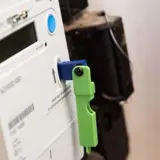Do it whenever you leave the room. And fit energy efficient bulbs. They’re more expensive initially but they use much less energy and replacing all bulbs in your home with these could save about £40 a year on your electricity bills. So they’re well worth it.
Increasing energy prices
Ofgem have announced the energy price cap will raise an average of 6% from 1 April 2025. This means a typical housing paying by direct debit will pay £1,849 per year. The price cap sets a limit of the maximum amount suppliers can charge for each unit of gas or energy you use, if you use more you pay more, if you use less you’ll pay less.
Depending on your personal energy usage, you may be better off fixing your bills. Money Saving Expert have a handy calculator which you can use to see what is most suitable for you.
We know that The Don't Pay Group are leading a campaign to get people to refuse to pay their energy bill.
If you are struggling to pay your gas or electricity bills make sure you contact your supplier and request support from us, as we may be able to help.
We don't provide financial advice, but we do want you to understand the impacts of not paying.
- If you don't agree a payment plan with your supplier, they might try to force you to have a pre-payment meter installed.
- In very rare cases, if you haven't paid a bill after 28 days you might be threatened with disconnection of your supply, but you'll normally be offered a meter instead.
- Your supplier may pass your details onto a debt collection agency - and there may be charges to cover the cost of this.
- Many suppliers charge extra fees for late payments, so this could be another additional cost.
- Paying by direct debit is normally the cheapest way to pay for gas and electricity, so if you cancel your direct debit then your bills will likely increase.
Not paying your bills could damage your credit rating and make it more difficult for you to borrow money in the future.
Energy myth busting - spend less on gas and electricity
The MoneySavingExpert has a handy guide which focuses on the grey areas and a lot of disputed claims around saving energy.
It’s surprising how much you can achieve by making a few easy adjustments to your home and daily habits. Just be consistent and you’ll soon see the savings build up. Try these ideas to get started:





